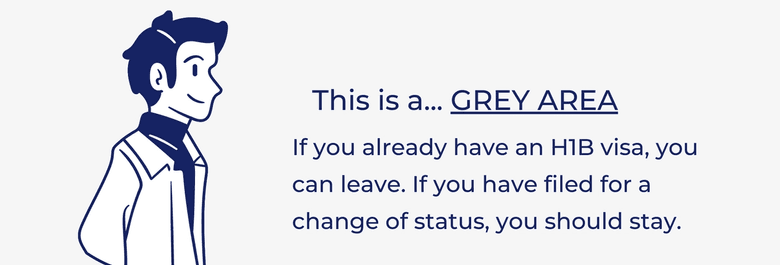It's no secret that H1B visas, and the processes associated with them, are fairly complex. This problem is enhanced by the global pandemic, and the fact that it caused U.S. Citizenship and Immigration Services to suspend premium processing until further notice (as of May 2020).
Even though things are tough right now, you're not alone. Thousands of people work in tech on an H1B visa, and we're here to help make things easier for as many of you as possible. To do that, we're debunking 5 common myths about premium processing.
5 Myths That We Want to Dispel
1. You have to pay for everything

Your sponsoring employer should take care of most costs associated with filing a H1B visa. This includes fees for basic filing, ACWIA, anti fraud, public law and more (for a full breakdown of employer responsibilities, see this article by the SGM law group).
When it comes to premium processing, things get a little more complex. While it's clear that the sponsor (employer) or attorney must file the request, there is conflicting information about who is supposed to pay this fee: DOL claims it's the employer's responsibility, while USCIS says it may be paid by the beneficiary (employee), employer, or even the attorney. Still others say that it depends on the reason for the request: if premium processing is requested by the employer for business-related reasons, it's on them to pay the fee. If it is requested by the employee for personal reasons (i.e. travel, peace of mind, etc), it's up to the employee to pay.
👉 Want to check out the DOL standards mentioned above? Refer to this link.
2. You have to hire your own law firm

Since your employer takes care of the application process and visa petition, an attorney is technically not necessary. In some cases, however, you or your employer may find legal assistance helpful. Folks with positions at lower wage or skill levels, recent graduates that opt to seek an H1B visa, folks with visa transfers to new employers, and anyone in an uncertain situation may benefit from legal representation.
There are two major factors worth mentioning: how to find an attorney and how to cover the cost.
1. How to find an attorney: If you're working for a medium to large company, odds are they have their own legal team. Many even have connections with lawyers that specialize in immigration law, or have taken on nonimmigrant workers as clients in the past . Some smaller companies or startups may be in the same situation. The point is: you'll never know unless you ask. Working with your employer to find the right attorney is the best course of action. That way, you both stay in the loop and avoid surprises.
Have an uncooperative employer, no legal connections, and you don't know where to start? USCIS offers this guide to finding an accredited attorney.
2. How to cover the cost: Your employer may opt to pay legal fees for any number of reasons, but they are not obligated to do so. This is because attorney fees are not a required part of the H1B application process. Before hiring an attorney, discuss potential costs (and who will cover them) with your employer. If they are unwilling to cover the costs, assess whether you can afford them, whether the service is worth the price, and any personal considerations that seem relevant.
3. You must remain in the United States while your petition is reviewed

This is yet another grey area. If you already have a H1B visa, you will likely be able to leave the country if you have an unexpired H1B visa stamp on your passport. This is often the case for folks transferring from one employer to another, or simply applying to extend their stay.
If you have filed a change of status (from a different nonimmigrant visa category to H1B), it is advised that you stay in the United States. International travel, regardless of the reasoning or necessity behind it, will likely cause USCIS to deny your status change. Even if they approve the petition as a whole, you would have to leave and reenter the country to activate your new status.
4. H1B processing times are way too long

If you file a standard H1B petition, processing times can seem a bit long. On average, it takes 7-10 days for a receipt notice to arrive, and another 3-5 months for the petition to be reviewed by USCIS. Depending on the processing center and extenuating circumstances, it could take even longer. Just about any source recommends that you file well before your current H1B visa expires.
Premium processing times, on the other hand, are substantially shorter: you receive a receipt notice within 2 days and the petition is reviewed within 15 days. In recent months, these requests have been suspended due to coronavirus. Under normal circumstances, however, premium processing requests should be submitted by your employer after filling out form I-907. More premium processing FAQs can be found here.
👉 Want to check the status of your petition? Refer to the USCIS website, linked here.
5. Premium processing is indefinitely suspended due to Covid-19

On March 20th of this year, USCIS announced temporary suspension of premium processing services due to covid-19. This applied to all I-129 and I-140 petitions, including H1B. The suspension was issued "until further notice" with no definitive end date, leaving many folks in a position of extreme uncertainty.
However, this suspension is no longer indefinite. Throughout the month of June, USCIS announced that it will resume premium processing for select petitions, prioritizing urgent cases and cap exempt positions. By the end of the month, they plan to lift the processing suspension altogether. Hopefully, this news will bring relief to some folks, and those who need premium processing will be able to access it!
We hope this guide helped demystify h1b premium processing. We also hope that, if you're in the interview process now, we can offer even more help-- Candor can still assist you in negotiating your salary, even if you need sponsorship. For more information, schedule a consultation with us soon!
The information provided herein is for general informational purposes only and is not intended to provide tax, legal, or investment advice and should not be construed as an offer to sell, a solicitation of an offer to buy, or a recommendation of any security by Candor, its employees and affiliates, or any third-party. Any expressions of opinion or assumptions are for illustrative purposes only and are subject to change without notice. Past performance is not a guarantee of future results and the opinions presented herein should not be viewed as an indicator of future performance. Investing in securities involves risk. Loss of principal is possible.
Third-party data has been obtained from sources we believe to be reliable; however, its accuracy, completeness, or reliability cannot be guaranteed. Candor does not receive compensation to promote or discuss any particular Company; however, Candor, its employees and affiliates, and/or its clients may hold positions in securities of the Companies discussed.
